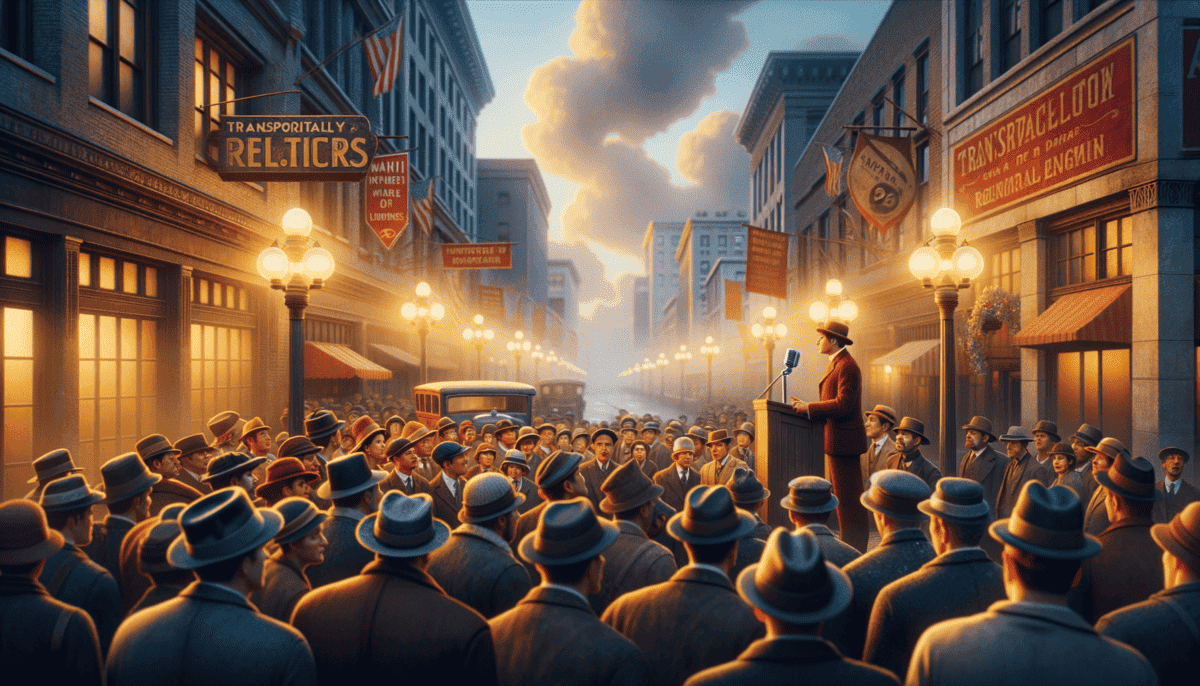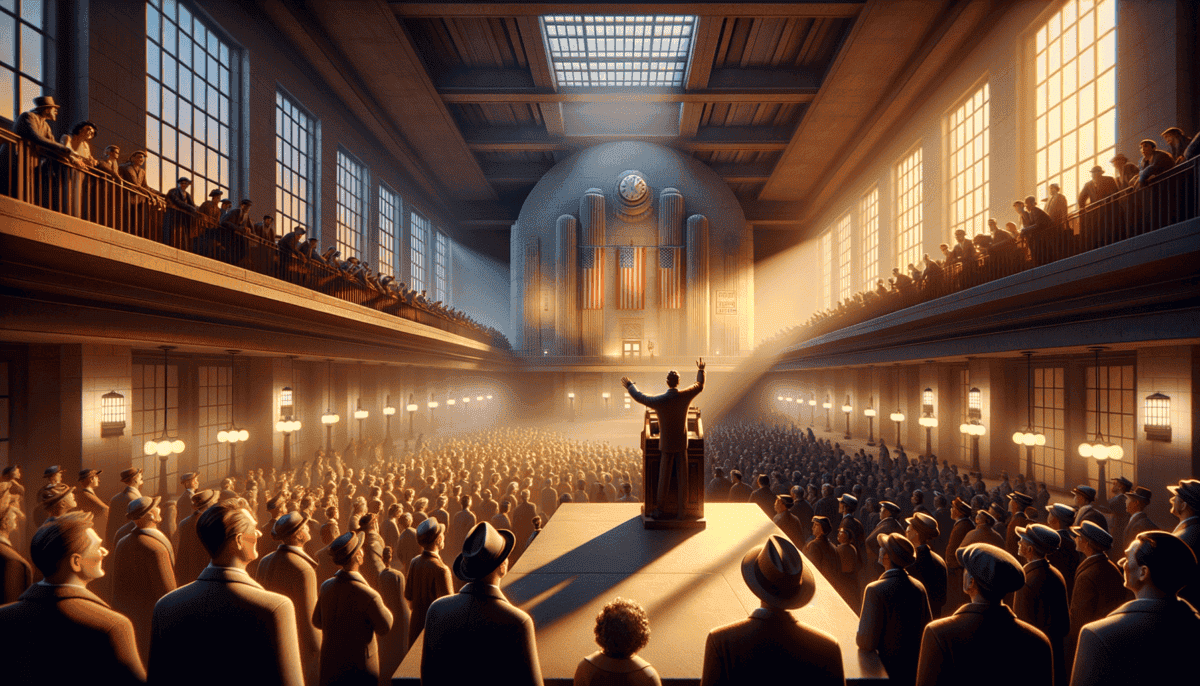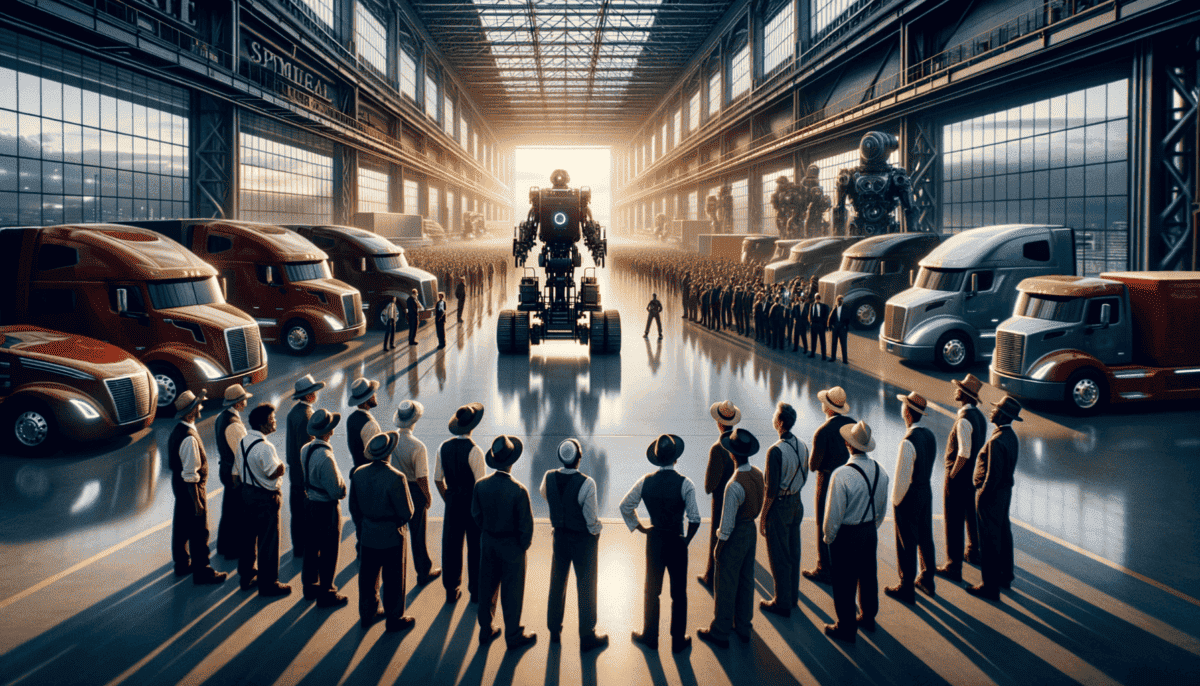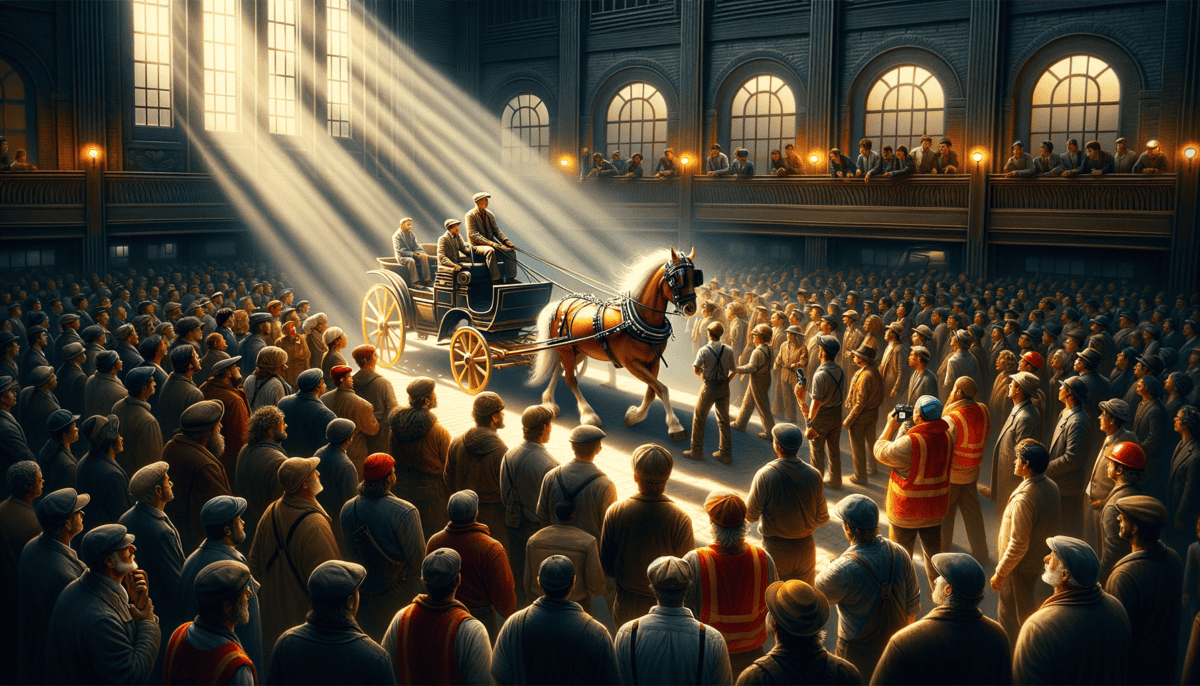The Horse-Drawn Beginnings
On a chilly morning in 1903, the streets of Chicago buzzed with the clip-clop of horse hooves. Tommy Miller wiped sweat from his brow as he guided his team of horses through the busy streets. His wagon was loaded with heavy boxes, and his arms ached from holding the reins all day.
"Another long day ahead," Tommy muttered to his horses. Back then, workers like Tommy were called "teamsters" because they worked with teams of horses.
Life wasn't easy for teamsters in those days. They worked from sunrise to sunset, often 7 days a week. Their backs hurt from loading heavy boxes. Their hands were rough from holding leather reins. And they didn't get paid much money for all their hard work.
One day, Tommy met other wagon drivers at a small café. "We need to work together," said Mike Kelly, a fellow teamster with bright eyes and a kind smile. "If we join forces, we can ask for better pay and shorter work days."
That's how the story of the International Brotherhood of Teamsters began. Workers like Tommy and Mike decided to form a group – a union – to help each other. They started with just a few hundred members in Chicago.
Working Together Makes Us Stronger
The teamsters faced big problems. Some bosses didn't want them to join together. But the workers knew they had to stick together. They helped each other when times were tough. If one teamster's horse got sick, others would pitch in. If someone needed food, they shared what they had.
"United we stand, divided we fall!" became their favorite saying. It meant they were stronger when they worked together.
“We’re not just drivers anymore,” Tommy told his friends. “We’re brothers looking out for each other.”
The union grew bigger and bigger. More workers joined from other cities:
• Wagon drivers
• Stable workers
• Horse caretakers
• Warehouse workers
Fighting for Better Lives
The teamsters asked for important changes:
- Shorter work days
- Better pay
- One day off each week
- Safer working conditions
It wasn't easy. Sometimes bosses would say no. But the teamsters didn't give up. They stood strong together. When one person spoke up, all of them spoke up.
Tommy noticed changes happening slowly. His arms still ached at the end of the day, but now he could rest on Sundays. He could buy better food for his family. His horses got better care too.
Growing Stronger Every Day
As more workers joined, the union became stronger. They helped each other learn to read and write. They shared tips about taking care of horses. They created friendly competitions to see who could drive their wagon the best.
"Remember when we first started?" Mike asked Tommy one evening. "Now look at us. We're like a big family."
Tommy smiled and patted his horses. "And we're just getting started," he said. "Just wait and see what we can do together."
The sun was setting over Chicago. Tommy guided his horses back to the stable. He knew tomorrow would bring new challenges. But he wasn't worried. He had his union brothers and sisters by his side. Together, they were changing the world, one wagon ride at a time.
More workers were joining every day. The teamsters were becoming a powerful voice for working people. They showed that when workers stand together, they can make life better for everyone.
Rising Through Hard Times
The year was 1929, and dark clouds were gathering over America. Banks were closing. Factories were shutting down. Many people lost their jobs. This time was called the Great Depression.
Sarah Thompson watched her father, a teamster named John, come home with worry on his face. “Times are tough, sweetie,” he said. “But the union is helping us stay strong.”
A New Leader Steps Up
In these hard times, a man named Daniel J. Tobin became the leader of the Teamsters. He was like a captain steering a ship through stormy seas.
“We must help each other,” Tobin told the workers. “When one teamster hurts, we all hurt. When one succeeds, we all succeed.”
“Unity is our strength. Together, we can weather any storm.” – Daniel J. Tobin
Finding New Ways to Work
The world was changing. Horses and wagons were being replaced by trucks. The Teamsters had to change too. They learned to drive trucks and fix engines. They helped each other learn new skills.
Sarah watched her father learn to drive a truck. “It’s different from the horses,” he told her. “But change isn’t always bad.”
Standing Together
When companies tried to cut wages, the Teamsters stood firm. They would stop working – this was called a strike. They held signs and walked in circles outside their workplace. They sang songs to keep their spirits up.
The most important things they fought for were:
- Fair pay for their work
- Safe trucks to drive
- Health care when sick
- Time off to rest
Helping Each Other
The Teamsters created special funds to help members in need. If someone got sick, the union helped pay their doctor bills. If someone couldn’t buy food, other members shared what they had.
“Remember when the Millers lost their home?” Sarah asked her father. “The union helped them find a new place.”
“That’s right,” John smiled. “We’re more than just workers. We’re family.”
Getting Stronger
Even during the hardest times, the Teamsters kept growing. They learned to talk with company bosses about better working conditions. This was called “collective bargaining.” It meant workers could speak with one voice.
One evening, Sarah found her father smiling at an old photo of his horse-drawn wagon. “Things are different now,” he said. “But some things stay the same. We still need each other. We still help each other. That’s what makes us strong.”
The Great Depression couldn’t break the Teamsters’ spirit. They grew stronger by working together. They showed that even in the darkest times, unity brings light. More challenges lay ahead, but the Teamsters were ready to face them – together.
The Rise of Jimmy Hoffa
A young man named Jimmy Hoffa walked into a Detroit grocery warehouse in 1932. He was only 19 years old. But he had big dreams for workers.
A Natural Leader
“We need better pay!” Jimmy told his fellow workers. “We need safer jobs! Who’s with me?” Many workers nodded in agreement.
Jimmy was good at getting people to listen. He wasn’t very tall, but he had a big voice and an even bigger heart. Workers trusted him because he fought for what was right.
“If you’ve got the courage to stand up, I’ve got the courage to lead you.” – Jimmy Hoffa
Making Things Better
Under Jimmy’s leadership, the Teamsters grew stronger than ever. He helped workers get:
- Higher wages to feed their families
- Better trucks to drive
- Health insurance when they got sick
- Vacation time to rest
- Pensions for when they got old
The Golden Years
Billy Martinez drove his shiny new truck down the highway. His dad had been a teamster too, but things were different now. “Dad used to work 16 hours a day,” Billy thought. “Now we work 8 hours and get paid more!”
Friends in High Places
Jimmy knew how to talk to important people. He met with company bosses and politicians. Sometimes they agreed with him, sometimes they didn’t. But they always listened when Jimmy spoke.
“My dad says Jimmy Hoffa can talk to presidents!” Billy told his friend Tommy during lunch break. “He makes them listen to what workers need!”
Changes and Challenges
The 1950s and 1960s were good years for the Teamsters. Workers could buy houses and send their kids to school. They could take vacations and save money for the future.
But success brought new problems. Some people didn’t like how powerful the Teamsters had become. They started watching Jimmy very closely.
A Strong Voice
One hot summer day, Jimmy stood before thousands of workers. “We are the backbone of America!” he shouted. “Without us, nothing moves. Without us, America stops!”
Billy looked up at the stage where Jimmy was speaking. “He’s not just fighting for us,” he thought. “He’s fighting for our families, our future.”
The crowd cheered as Jimmy finished his speech. They knew they were part of something big. The Teamsters weren’t just a union anymore. They were a movement, a family, a force for change.
The sun was setting on another busy day. Trucks rolled across America’s highways. Workers headed home to their families. And somewhere, Jimmy Hoffa was already planning the next fight for better working conditions.
Dark Days and Hidden Truths
The warm summer of 1975 brought big changes for the Teamsters. Things weren’t as happy as before. Some people said bad things were happening inside the union.
Missing Leader
One hot July day, Jimmy Hoffa went to meet someone at a restaurant called the Machus Red Fox. He never came back.
“Where’s Jimmy?” workers asked each other. Nobody knew. It was like he had disappeared into thin air.
“Jimmy always fought for us. Now he’s gone, and we don’t know why.” – Tom Wilson, truck driver
Worried Workers
Sarah Thompson sat in her truck, thinking about the changes. Her dad had been a Teamster for thirty years.
“Things are different now,” she told her friend Mike during their lunch break. “Remember how Jimmy used to visit the workers? The new leaders don’t do that.”
Making Things Right
The union needed to clean up its act. Good people in the Teamsters worked hard to fix the problems:
- New rules to stop bad behavior
- Better ways to watch how money was spent
- More power for regular workers to speak up
- Honest leaders who followed the law
- Regular checks to make sure everything was fair
Hope for Better Days
Mike Garcia had just joined the Teamsters. He was young and full of hope. “My grandfather tells me stories about the old days,” he said. “I want to help make the union strong and good again.”
Workers like Mike knew the union was still important. They needed it to protect their jobs and rights.
Working Together
Sarah watched new trucks roll into the yard. “We’re still here,” she thought. “We’re still moving America forward.”
Learning from Mistakes
“What happened to the union?” young Mike asked Sarah one day.
“Sometimes good things can go wrong,” she explained. “But we learn from mistakes. We get stronger. We do better.”
The sun was setting on another workday. Trucks still rolled across America. Workers still needed their union. And the Teamsters were changing, growing, trying to be better than before.
Mike looked at his union card with pride. “We’re not perfect,” he thought. “But we’re family. And families stick together, even when times are tough.”
The story of the Teamsters wasn’t over. It was just entering a new chapter. A chapter about healing, learning, and becoming stronger than ever.
New Roads Ahead
The big trucks looked different now. They had computers inside! Sarah watched as young drivers tapped on screens in their cabs. Things were changing fast.
Learning New Ways
Mike sat in a classroom with other drivers. They were learning about GPS and electronic logs.
“Remember paper maps?” laughed Tom, an older driver. “Now the computer tells us where to go!”
“We have to change with the times, but we won’t forget what matters – taking care of our workers.” – Linda Chen, Teamsters trainer
More Than Just Trucks
The Teamsters weren’t just for truck drivers anymore. They helped lots of different workers:
- Airplane workers at airports
- People who work in warehouses
- Delivery drivers for companies like UPS
- Workers who fix cars and trucks
- People who help in hospitals
Sarah’s Story
Sarah remembered her first day as a driver twenty years ago. Now she helped train new workers.
“The trucks are smarter now,” she told a group of trainees. “But being a good worker still means the same thing – being safe and caring about your job.”
Robots and Workers
Some people worried about robots taking their jobs. The Teamsters worked hard to protect workers.
“Robots can help us,” explained Union Leader Bob Martinez. “But they can’t replace good workers who think and care about what they do.”
Making Things Better
Maria was new to the union. She worked in a big warehouse with robots.
“The union makes sure we’re treated fairly,” she said. “They help us learn about new technology and keep us safe.”
Clean and Green
The Teamsters cared about the Earth too. They worked with companies to use trucks that didn’t pollute as much.
“My new truck runs on electricity!” Mike said proudly. “It’s quiet and clean. My kids love it!”
Standing Together
The world was changing fast. But some things stayed the same. Workers still needed to help each other.
“We’re stronger together,” Sarah told her trainees. “That’s what the Teamsters have always been about.”
As the sun set, Sarah watched electric trucks glide silently out of the yard. The future was here, and the Teamsters were ready for it.
“Times change,” she thought, “but good people working together never goes out of style.”
Standing Strong Together
The morning sun shone bright as Maria walked into the big meeting hall. Workers from all over had come together. Some drove trucks, others worked in warehouses. All were Teamsters.
New Challenges
Tom, an older driver, stood up to speak. “When I started, we didn’t have robot helpers or electric trucks. Now everything’s different!”
Sarah nodded. “But we still need good people doing good work. That will never change.”
Helping Everyone
The Teamsters were working hard to help all kinds of workers:
- Teaching about new technology
- Making sure jobs are safe
- Fighting for fair pay
- Protecting worker rights
- Supporting families
“We’re not just a union. We’re a family that takes care of each other.” – Maria Rodriguez, Warehouse Worker
Looking to Tomorrow
Young workers like Joey were excited about the future. He drove an electric delivery van.
“The union helps us learn about new things,” he said. “And they make sure we’re treated fairly while we learn.”
Working Together
Linda, a hospital worker, shared her story. “The Teamsters helped me get better pay and safer working conditions. Now I can take better care of my family.”
“That’s what we do,” Sarah smiled. “We help each other.” ❤️
Global Connection
The Teamsters worked with unions around the world. They shared ideas about helping workers everywhere.
“We’re all connected,” Mike explained. “What happens to workers in one place affects workers everywhere.”
The Road Ahead
As the meeting ended, workers shared stories and made plans. The world was changing, but they would face it together.
Sarah looked around the room filled with workers, young and old. “This is what the Teamsters have always been about – people helping people.”
Outside, the city was busy with workers doing their jobs. The Teamsters would be there, making sure every worker had a voice and a fair chance.
The story of the Teamsters wasn’t over. It was just beginning a new chapter, with more workers joining every day. Together, they would make the future better for everyone.






